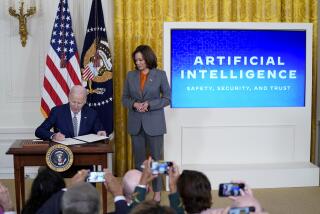Get Smart on Encryption
- Share via
Although the Clinton administration remains wedded to keeping some control over the export of sophisticated secrecy software, a new federal court ruling is a severe blow to its outmoded and unreasonable stand.
U.S. policy in the matter has been guided by Cold War-era national security concerns. The administration argues that completely unrestricted export of the most sophisticated encryption technology would allow it to fall into the hands of criminals and terrorists aiming to conceal conspiracies.
What is encryption? Think of it as a businessman using a rare language, like Urdu, to confer privately with associates and customers on the Internet. The more complicated the language, the harder it is to decipher, for competitors, police and spy catchers alike.
But this horse hasn’t just left the barn, it’s been on a worldwide tour. There are no domestic restrictions on the purchase of the best American encryption software; moreover, foreign competitors freely sell state-of-the-art encryption around the world, including in the United States. In other words, this technology is already very accessible.
To date, American companies and individuals have been allowed to export or disseminate only relatively simple, and more easily broken, encryption. The main thing hindered by this restriction is the competitiveness of American software companies abroad, since sophisticated buyers want encryption built into communication and business programming.
In this week’s court ruling, certain to be appealed, a federal judge in San Francisco held that the government’s restrictions on the encryption exports are an unconstitutional violation of free speech.
In October, for the third time in three years, the administration proposed to ease the export restrictions, but the offer did not go far enough.
Software industry officials and national security experts this past summer told Congress that law enforcement agencies, armed with court warrants similar to those used in telephone wiretap cases, would be able to obtain the software keys to decode encryption language because U.S. companies usually keep such keys. Ensuring federal access to means of decoding ought be the administration’s primary focus, not unworkable export controls.






